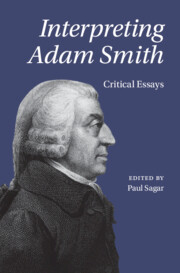Book contents
- Interpreting Adam Smith
- Interpreting Adam Smith
- Copyright page
- Contents
- Contributors
- Acknowledgements
- Abbreviations of Works by Adam Smith
- Introduction
- 1 Smith Scholarship
- 2 The Wealth of Nations as a Work of Social Science
- 3 Adam Smith’s “Industrial Organization” of Religion
- 4 Talking to My Butcher
- 5 What Did Adam Smith Mean? The Semantics of the Opening Key Principles in the Wealth of Nations
- 6 Adam Smith and Virtuous Business
- 7 Adam Smith and the Morality of Political Economy
- 8 A Moral Philosophy for Commercial Society?
- 9 Adam Smith, Sufficientarian
- 10 Narrowing the Scope of Resentment in Smith’s Theory of Moral Sentiments
- 11 Adam Smith
- 12 “Much Better Instructors”
- 13 Sophie de Grouchy as an Activist Interpreter of Adam Smith
- 14 Adam Smith and the Limits of Philosophy
- Bibliography
- Index
8 - A Moral Philosophy for Commercial Society?
Published online by Cambridge University Press: 14 September 2023
- Interpreting Adam Smith
- Interpreting Adam Smith
- Copyright page
- Contents
- Contributors
- Acknowledgements
- Abbreviations of Works by Adam Smith
- Introduction
- 1 Smith Scholarship
- 2 The Wealth of Nations as a Work of Social Science
- 3 Adam Smith’s “Industrial Organization” of Religion
- 4 Talking to My Butcher
- 5 What Did Adam Smith Mean? The Semantics of the Opening Key Principles in the Wealth of Nations
- 6 Adam Smith and Virtuous Business
- 7 Adam Smith and the Morality of Political Economy
- 8 A Moral Philosophy for Commercial Society?
- 9 Adam Smith, Sufficientarian
- 10 Narrowing the Scope of Resentment in Smith’s Theory of Moral Sentiments
- 11 Adam Smith
- 12 “Much Better Instructors”
- 13 Sophie de Grouchy as an Activist Interpreter of Adam Smith
- 14 Adam Smith and the Limits of Philosophy
- Bibliography
- Index
Summary
This chapter challenges the view that The Theory of Moral Sentiments (TMS) is concerned with analyzing modern commercial society – a view that is especially prominent amongst those who turn to Adam Smith to help identify the malaises of capitalist societies today and their potential remedies. The chapter proceeds by, first, examining what both Adam Smith and Smith scholars mean by commercial society, and whether this concept has any place in TMS; second, assessing whether TMS should be read as response to other theorists of modern commercial society (Bernard Mandeville and Jean-Jacques Rousseau); and, third, analyzing whether Smith’s reflections on moral corruption, inequality, and prudence in TMS should be associated with commercial society. The chapter concludes with some brief reflections on why many Smith commentators superimpose the concept of commercial society onto TMS, speculating that this can be partially explained by the broader tendency in much recent scholarship to read TMS and the Wealth of Nations as forming a coherent whole, rather than as independent works that mostly address distinct questions.
- Type
- Chapter
- Information
- Interpreting Adam SmithCritical Essays, pp. 124 - 141Publisher: Cambridge University PressPrint publication year: 2023

